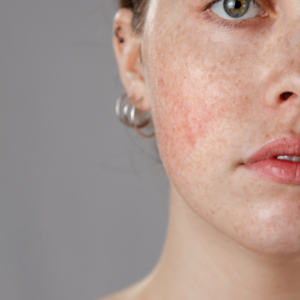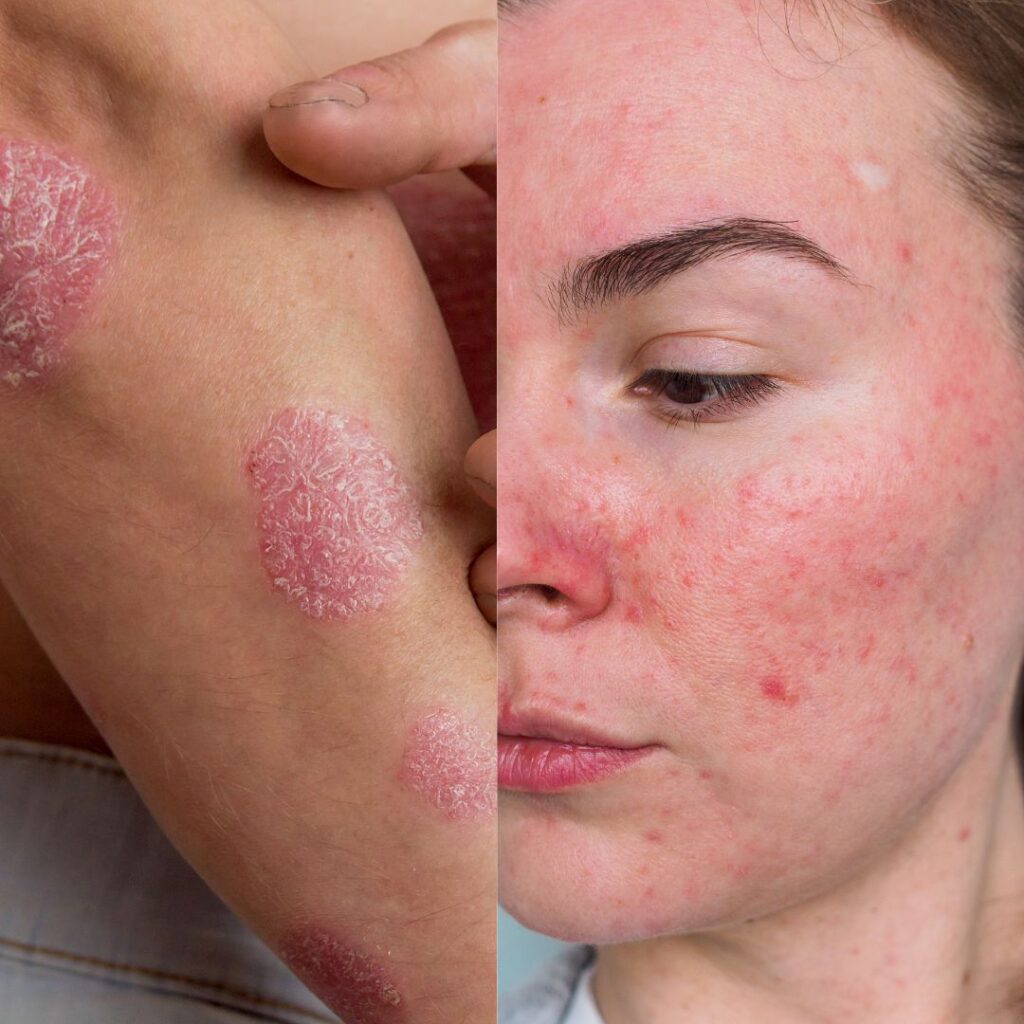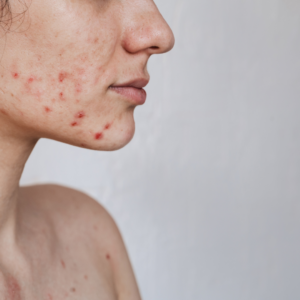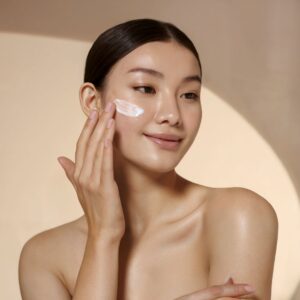
Rosacea Awareness Month: Signs, Symptoms & Treatment Options
Discover a youthful lift without surgery. Learn how our thread lift at Bryn Mawr Dermatology can rejuvenate your appearance.
Did you know over 85 million Americans are affected by skin conditions yearly? Among these, eczema and rosacea stand out for their prevalence. Both conditions also share similar symptoms, making it challenging for those affected to tell them apart. This article aims to explain eczema and rosacea, offering clear insights into each condition’s characteristics, symptoms, and treatment options. We’ll guide you through understanding these conditions and how to distinguish between them. Discover how Bryn Mawr Dermatology can assist you in managing these conditions effectively and help you get one step closer to better skin health.
While this article spells out some important information about eczema vs rosacea, we highly recommend you read the full article, here are the key points we will focus on:

Rosacea is a chronic, inflammatory skin condition that affects over 16 million Americans. It primarily affects the face, manifesting as redness, swelling, and often acne-like bumps. Unlike occasional blushing or flushing, rosacea symptoms persist and cycle through flare-ups and remissions. The exact cause of rosacea is unknown, but it is thought to result from a combination of genetic predisposition and environmental triggers. These triggers, which differ from person to person, can include sun exposure, hot or cold weather, spicy foods, alcohol, and stress, leading to increased blood flow to the skin and the visible symptoms of rosacea.
Rosacea presents in several forms, each with its own set of characteristics:
Rosacea is most commonly diagnosed in middle-aged women with fair skin, but it can affect anyone, regardless of age or skin type.
Eczema, also known as atopic dermatitis, is a common skin condition that causes patches of skin to become inflamed, itchy, red, cracked, and rough. Blisters may sometimes occur. Due to its chronic nature and the intense itching it often provokes, eczema is different from other skin conditions. The condition is most commonly found in children but can continue into adulthood or even start at an older age. The exact cause of eczema is not fully understood, but it is believed to be linked to genetic and environmental factors. These can include irritants found in soaps, detergents, and shampoos, allergens like pets, pollen, mold, and dandruff, certain foods, stress, and changes in weather or humidity. People with eczema often have an overactive immune system that responds aggressively when triggered by these factors, leading to the symptoms of eczema.
Eczema manifests in several forms, each with distinct features and triggers:
Managing eczema involves identifying and avoiding triggers, maintaining skin hydration, and using prescribed treatments to control symptoms.
While rosacea and eczema are distinct conditions, they share overlapping symptoms such as irregular skin texture and color, and flares that will often resolve on their own, but then recur. This makes them difficult to distinguish without a professional evaluation. Both are influenced by outside factors like the weather, compounds you come into contact with and/or ingest, and stress. Both have underlying genetic predispositions, so if you have a family member with either, you are more likely to develop symptoms yourself. Both conditions involve chronic inflammation and can significantly affect a person’s quality of life, underscoring the importance of accurate diagnosis and personalized treatment.
Understanding the differences between rosacea and eczema is essential for the proper treatment. The presentation is different: rosacea typically presents on the central face and is often symmetrical, while eczema can be present on the face, but also affects the limbs and torso in equal amounts. The sensations that each produces are unique: rosacea flares can feel hot and tight, while eczema tends to be itchy and can evolve into painful patches if not treated. Who each disease affects is distinctive as well, with eczema more prevalent in children and rosacea more common in adults.
A stand out difference is that each disease requires its own, very specialized, management strategy when it comes to prescription medication. Treating rosacea with eczema medications will not help symptoms resolve, and may actually make them work. This applies to treating eczema with rosacea medications as well. Our dermatologists at Bryn Mawr Dermatology are highly experienced in treating both conditions, leveraging our expertise to improve patient’s skin health and quality of life.
Identifying the right time to seek treatment for eczema and rosacea allows patients to manage them timely. Early intervention can prevent the conditions from escalating and significantly improve quality of life. Consult a dermatologist if you notice persistent redness, itching, or skin irritation that doesn’t improve with over-the-counter products or worsens over time.
Bryn Mawr Dermatology offers tailored treatments for both eczema and rosacea to alleviate symptoms and improve skin health. For rosacea, options include topical prescriptions to soothe irritation, laser skin care to diminish redness and visible blood vessels, prescription oral medications for more severe cases, and trigger counseling to identify and avoid exacerbating factors.
Our approach to eczema involves customized skincare recommendations, the revolutionary injectable Dupixent for severe cases, and at-home therapies like prescription steroids, gentle cleansers, and moisturization techniques. We focus on individualized care, emphasizing gentle skin care, avoiding irritants, and managing seasonal changes to minimize flare-ups.
If you’re navigating the challenges of eczema or rosacea, we’re here to help. Schedule a consultation with our expert team to evaluate your condition and develop a personalized treatment plan for you. Our welcoming Bryn Mawr office is designed for comfort, ensuring a positive start to your journey towards better skin health. Call us at (610)-525-780 today to begin your path to clearer and healthier skin. We’re eager to provide the care and support you need!

Discover a youthful lift without surgery. Learn how our thread lift at Bryn Mawr Dermatology can rejuvenate your appearance.

Discover a youthful lift without surgery. Learn how our thread lift at Bryn Mawr Dermatology can rejuvenate your appearance.

Discover a youthful lift without surgery. Learn how our thread lift at Bryn Mawr Dermatology can rejuvenate your appearance.

Struggling with acne scars? Discover the best dermatologist-approved treatments for smoother, clearer skin.

Looking to get your body summer-ready? Explore CoolTone and other expert treatments at Bryn Mawr Dermatology. Book your consultation today!

Looking to get your body summer-ready? Explore CoolTone and other expert treatments at Bryn Mawr Dermatology. Book your consultation today!

By: Bryn Mawr Dermatology, Published: April 25, 2024
Medically Reviewed By: Christine Stanko, MD, FAAD – April 25, 2024
For COSMETIC APPOINTMENTS:
For MEDICAL APPOINTMENTS: